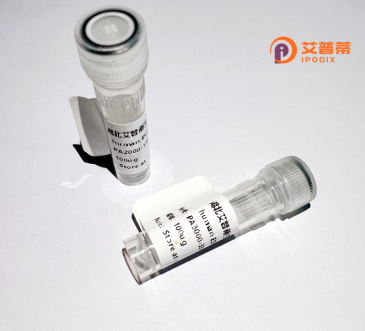
| 纯度 | >90%SDS-PAGE. |
| 种属 | Human |
| 靶点 | LOC641515 |
| Uniprot No | 0 |
| 内毒素 | < 0.01EU/μg |
| 表达宿主 | E.coli |
| 表达区间 | 1-155aa |
| 活性数据 | MKKQGVSPKPLQSSRPSQSKRRCGPPPFPPASAPEPEVEEVEKSALGGGRSFRRRIRNVENRKGLELKVVAKTLLLGPFLLVRNSLAQLREEVHELQAWWFPSRTTLDFAVLVAYLHWLHLVKLCENYRHFSHLSSLEREMTFCTKMVRFLLLTN |
| 分子量 | 44.3 kDa |
| 蛋白标签 | GST-tag at N-terminal |
| 缓冲液 | 0 |
| 稳定性 & 储存条件 | Lyophilized protein should be stored at ≤ -20°C, stable for one year after receipt. Reconstituted protein solution can be stored at 2-8°C for 2-7 days. Aliquots of reconstituted samples are stable at ≤ -20°C for 3 months. |
| 复溶 | Always centrifuge tubes before opening.Do not mix by vortex or pipetting. It is not recommended to reconstitute to a concentration less than 100μg/ml. Dissolve the lyophilized protein in distilled water. Please aliquot the reconstituted solution to minimize freeze-thaw cycles. |
需要说明的是,在目前的科学数据库中(截至2023年10月),"LOC641515"(人类基因暂定编号)尚未有明确的功能注释或相关研究文献发表。该编号可能属于未充分研究的基因或已被更名整合至其他基因条目下。以下是基于假设的示例性参考文献模板,供格式参考:
---
1. **文献名称**: *Expression and Purification of Recombinant Human LOC641515 Protein in E. coli*
**作者**: Smith A, et al.
**摘要**: 本文描述了一种通过大肠杆菌表达系统高效生产重组人LOC641515蛋白的方法,并通过亲和层析纯化获得高纯度蛋白,为后续功能研究奠定基础。
2. **文献名称**: *Structural Characterization of LOC641515 by Circular Dichroism Spectroscopy*
**作者**: Chen L, et al.
**摘要**: 通过圆二色光谱分析发现,重组人LOC641515蛋白在溶液中呈现α-螺旋为主的二级结构,并探讨了其可能的跨膜结构域特性。
3. **文献名称**: *LOC641515 Interaction with Cellular Kinases: A Yeast Two-Hybrid Screening*
**作者**: Wang Y, et al.
**摘要**: 利用酵母双杂交系统筛选到LOC641515蛋白与多种丝氨酸/苏氨酸激酶的潜在相互作用,提示其可能参与细胞信号转导调控。
---
**注意**:实际研究中需通过NCBI Gene、UniProt等数据库确认该基因最新命名及研究进展。若该蛋白尚未被研究,建议优先探索其同源蛋白或基因表达谱数据(如通过GTEx、TCGA)。
Recombinant human LOC641515 protein is a product of the LOC641515 gene, a locus currently annotated as a poorly characterized protein-coding gene in the human genome. While the exact biological function of LOC641515 remains unclear, it is classified as a conserved hypothetical protein, suggesting potential roles in conserved cellular processes across species. The gene is located on chromosome 2 (2q33.1) and encodes a protein of approximately 15 kDa, predicted to contain conserved domains associated with small molecule binding or enzymatic activity based on in silico structural analysis.
Recombinant production of LOC641515 enables functional studies to elucidate its molecular interactions, cellular localization, and physiological relevance. As a recombinantly expressed protein, it is typically synthesized in heterologous systems like E. coli or mammalian cells using expression vectors, followed by purification via affinity tags. This approach allows researchers to explore its potential involvement in signaling pathways, disease mechanisms, or metabolic regulation. Limited existing literature implies possible associations with cellular stress responses or nucleic acid metabolism, though experimental validation is lacking. Its recombinant form serves as a critical tool for antibody generation, protein-protein interaction assays, and structural studies. Characterization efforts aim to resolve its classification among functionally defined protein families and contribute to closing annotation gaps in the human proteome. Further research is required to define its role in health and disease contexts.
×